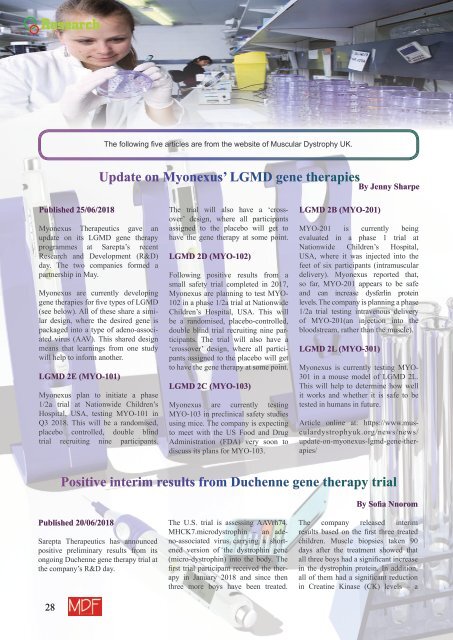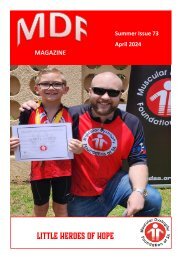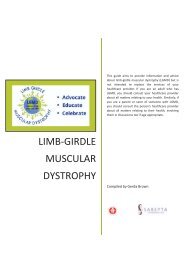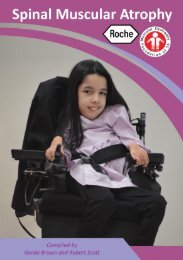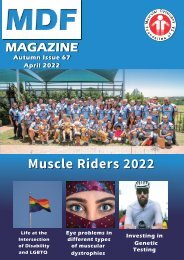MDF Magazine Newsletter Issue 56 August 2018
You also want an ePaper? Increase the reach of your titles
YUMPU automatically turns print PDFs into web optimized ePapers that Google loves.
Research<br />
The following five articles are from the website of Muscular Dystrophy UK.<br />
Update on Myonexus’ LGMD gene therapies<br />
By Jenny Sharpe<br />
Published 25/06/<strong>2018</strong><br />
Myonexus Therapeutics gave an<br />
update on its LGMD gene therapy<br />
programmes at Sarepta’s recent<br />
Research and Development (R&D)<br />
day. The two companies formed a<br />
partnership in May.<br />
Myonexus are currently developing<br />
gene therapies for five types of LGMD<br />
(see below). All of these share a similar<br />
design, where the desired gene is<br />
packaged into a type of adeno-associated<br />
virus (AAV). This shared design<br />
means that learnings from one study<br />
will help to inform another.<br />
LGMD 2E (MYO-101)<br />
Myonexus plan to initiate a phase<br />
1/2a trial at Nationwide Children’s<br />
Hospital, USA, testing MYO-101 in<br />
Q3 <strong>2018</strong>. This will be a randomised,<br />
placebo controlled, double blind<br />
trial recruiting nine participants.<br />
The trial will also have a ‘crossover’<br />
design, where all participants<br />
assigned to the placebo will get to<br />
have the gene therapy at some point.<br />
LGMD 2D (MYO-102)<br />
Following positive results from a<br />
small safety trial completed in 2017,<br />
Myonexus are planning to test MYO-<br />
102 in a phase 1/2a trial at Nationwide<br />
Children’s Hospital, USA. This will<br />
be a randomised, placebo-controlled,<br />
double blind trial recruiting nine participants.<br />
The trial will also have a<br />
‘crossover’ design, where all participants<br />
assigned to the placebo will get<br />
to have the gene therapy at some point.<br />
LGMD 2C (MYO-103)<br />
Myonexus are currently testing<br />
MYO-103 in preclinical safety studies<br />
using mice. The company is expecting<br />
to meet with the US Food and Drug<br />
Administration (FDA) very soon to<br />
discuss its plans for MYO-103.<br />
LGMD 2B (MYO-201)<br />
MYO-201 is currently being<br />
evaluated in a phase 1 trial at<br />
Nationwide Children’s Hospital,<br />
USA, where it was injected into the<br />
feet of six participants (intramuscular<br />
delivery). Myonexus reported that,<br />
so far, MYO-201 appears to be safe<br />
and can increase dysferlin protein<br />
levels. The company is planning a phase<br />
1/2a trial testing intravenous delivery<br />
of MYO-201(an injection into the<br />
bloodstream, rather than the muscle).<br />
LGMD 2L (MYO-301)<br />
Myonexus is currently testing MYO-<br />
301 in a mouse model of LGMD 2L.<br />
This will help to determine how well<br />
it works and whether it is safe to be<br />
tested in humans in future.<br />
Article online at: https://www.musculardystrophyuk.org/news/news/<br />
update-on-myonexus-lgmd-gene-therapies/<br />
Positive interim results from Duchenne gene therapy trial<br />
By Sofia Nnorom<br />
Published 20/06/<strong>2018</strong><br />
Sarepta Therapeutics has announced<br />
positive preliminary results from its<br />
ongoing Duchenne gene therapy trial at<br />
the company’s R&D day.<br />
28<br />
The U.S. trial is assessing AAVrh74.<br />
MHCK7.microdystrophin – an adeno-associated<br />
virus carrying a shortened<br />
version of the dystrophin gene<br />
(micro-dystrophin) into the body. The<br />
first trial participant received the therapy<br />
in January <strong>2018</strong> and since then<br />
three more boys have been treated.<br />
The company released interim<br />
results based on the first three treated<br />
children. Muscle biopsies taken 90<br />
days after the treatment showed that<br />
all three boys had a significant increase<br />
in the dystrophin protein. In addition,<br />
all of them had a significant reduction<br />
in Creatine Kinase (CK) levels – a


